МЕСТОИМЕНИЕ.pptx
- Количество слайдов: 24
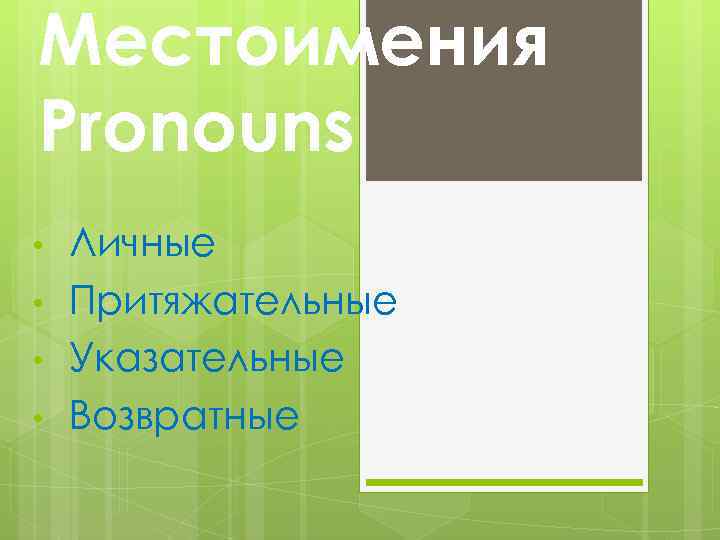 Местоимения Pronouns • • Личные Притяжательные Указательные Возвратные
Местоимения Pronouns • • Личные Притяжательные Указательные Возвратные
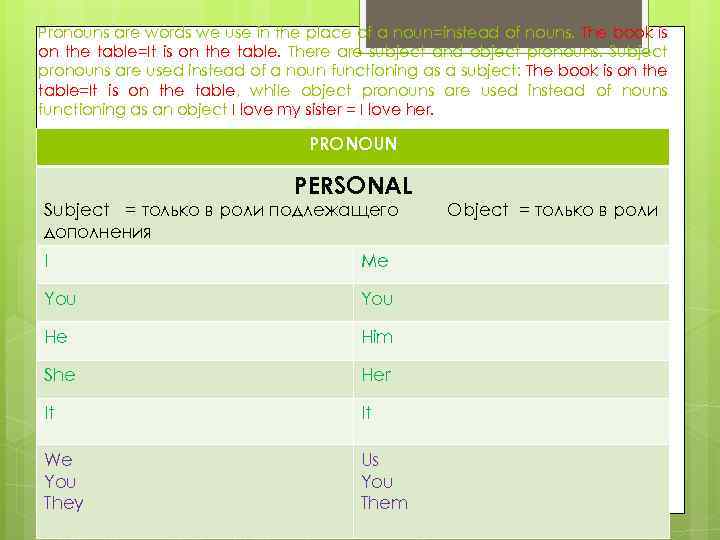 Pronouns are words we use in the place of a noun=instead of nouns. The book is on the table=It is on the table. There are subject and object pronouns. Subject pronouns are used instead of a noun functioning as a subject: The book is on the table=It is on the table, while object pronouns are used instead of nouns functioning as an object I love my sister = I love her. PRONOUN PERSONAL Subject = только в роли подлежащего дополнения I Me You He Him She Her It It We You They Us You Them Object = только в роли
Pronouns are words we use in the place of a noun=instead of nouns. The book is on the table=It is on the table. There are subject and object pronouns. Subject pronouns are used instead of a noun functioning as a subject: The book is on the table=It is on the table, while object pronouns are used instead of nouns functioning as an object I love my sister = I love her. PRONOUN PERSONAL Subject = только в роли подлежащего дополнения I Me You He Him She Her It It We You They Us You Them Object = только в роли
 She calls me/him/her/us/them every day. Don’t look at us/me/him/her…
She calls me/him/her/us/them every day. Don’t look at us/me/him/her…
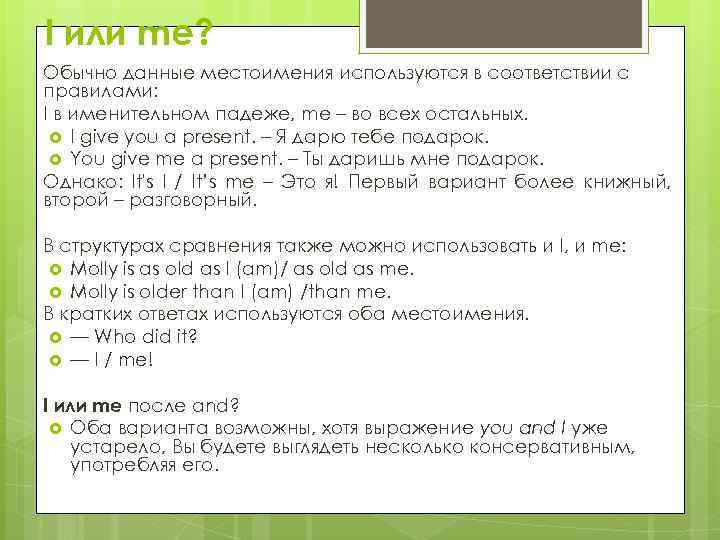 I или me? Обычно данные местоимения используются в соответствии с правилами: I в именительном падеже, me – во всех остальных. I give you a present. – Я дарю тебе подарок. You give me a present. – Ты даришь мне подарок. Однако: It's I / It’s me – Это я! Первый вариант более книжный, второй – разговорный. В структурах сравнения также можно использовать и I, и me: Molly is as old as I (am)/ as old as me. Molly is older than I (am) /than me. В кратких ответах используются оба местоимения. — Who did it? — I / me! I или me после and? Оба варианта возможны, хотя выражение you and I уже устарело, Вы будете выглядеть несколько консервативным, употребляя его.
I или me? Обычно данные местоимения используются в соответствии с правилами: I в именительном падеже, me – во всех остальных. I give you a present. – Я дарю тебе подарок. You give me a present. – Ты даришь мне подарок. Однако: It's I / It’s me – Это я! Первый вариант более книжный, второй – разговорный. В структурах сравнения также можно использовать и I, и me: Molly is as old as I (am)/ as old as me. Molly is older than I (am) /than me. В кратких ответах используются оба местоимения. — Who did it? — I / me! I или me после and? Оба варианта возможны, хотя выражение you and I уже устарело, Вы будете выглядеть несколько консервативным, употребляя его.
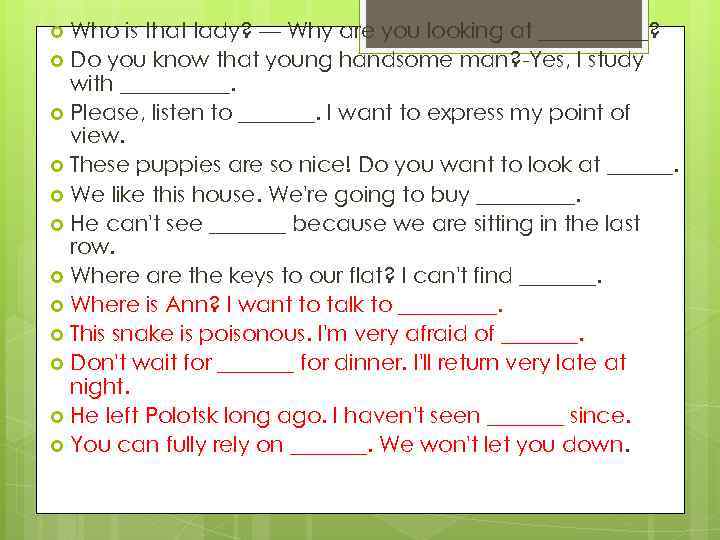 Who is that lady? — Why are you looking at _____? Do you know that young handsome man? -Yes, I study with _____. Please, listen to _______. I want to express my point of view. These puppies are so nice! Do you want to look at ______. We like this house. We're going to buy _____. He can't see _______ because we are sitting in the last row. Where are the keys to our flat? I can't find _______. Where is Ann? I want to talk to _____. This snake is poisonous. I'm very afraid of _______. Don't wait for _______ for dinner. I'll return very late at night. He left Polotsk long ago. I haven't seen _______ since. You can fully rely on _______. We won't let you down.
Who is that lady? — Why are you looking at _____? Do you know that young handsome man? -Yes, I study with _____. Please, listen to _______. I want to express my point of view. These puppies are so nice! Do you want to look at ______. We like this house. We're going to buy _____. He can't see _______ because we are sitting in the last row. Where are the keys to our flat? I can't find _______. Where is Ann? I want to talk to _____. This snake is poisonous. I'm very afraid of _______. Don't wait for _______ for dinner. I'll return very late at night. He left Polotsk long ago. I haven't seen _______ since. You can fully rely on _______. We won't let you down.
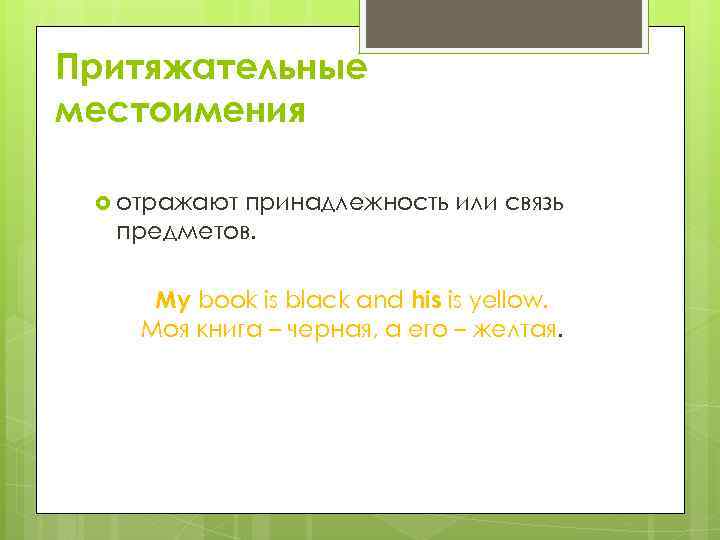 Притяжательные местоимения отражают принадлежность или связь предметов. My book is black and his is yellow. Моя книга – черная, а его – желтая.
Притяжательные местоимения отражают принадлежность или связь предметов. My book is black and his is yellow. Моя книга – черная, а его – желтая.
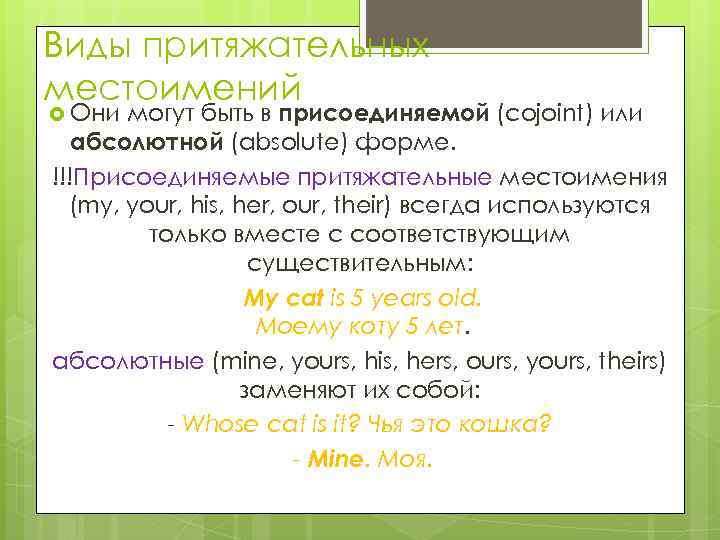 Виды притяжательных местоимений могут быть в присоединяемой (cojoint) или абсолютной (absolute) форме. !!!Присоединяемые притяжательные местоимения (my, your, his, her, our, their) всегда используются только вместе с соответствующим существительным: My cat is 5 years old. Моему коту 5 лет. абсолютные (mine, yours, his, hers, ours, yours, theirs) заменяют их собой: - Whose cat is it? Чья это кошка? - Mine. Моя. Они
Виды притяжательных местоимений могут быть в присоединяемой (cojoint) или абсолютной (absolute) форме. !!!Присоединяемые притяжательные местоимения (my, your, his, her, our, their) всегда используются только вместе с соответствующим существительным: My cat is 5 years old. Моему коту 5 лет. абсолютные (mine, yours, his, hers, ours, yours, theirs) заменяют их собой: - Whose cat is it? Чья это кошка? - Mine. Моя. Они
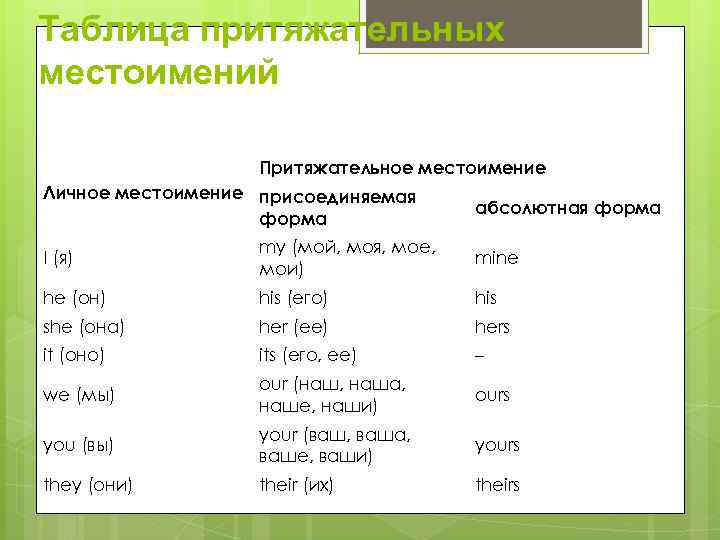 Таблица притяжательных местоимений Притяжательное местоимение Личное местоимение присоединяемая форма абсолютная форма I (я) my (мой, моя, мое, мои) mine he (он) his (его) his she (она) her (ее) hers it (оно) its (его, ее) – we (мы) our (наш, наша, наше, наши) ours you (вы) your (ваш, ваша, ваше, ваши) yours they (они) their (их) theirs
Таблица притяжательных местоимений Притяжательное местоимение Личное местоимение присоединяемая форма абсолютная форма I (я) my (мой, моя, мое, мои) mine he (он) his (его) his she (она) her (ее) hers it (оно) its (его, ее) – we (мы) our (наш, наша, наше, наши) ours you (вы) your (ваш, ваша, ваше, ваши) yours they (они) their (их) theirs
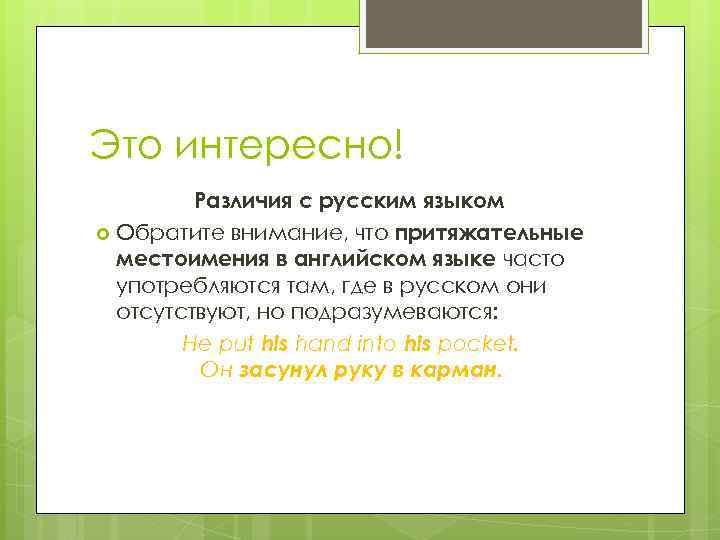 Это интересно! Различия с русским языком Обратите внимание, что притяжательные местоимения в английском языке часто употребляются там, где в русском они отсутствуют, но подразумеваются: He put his hand into his pocket. Он засунул руку в карман.
Это интересно! Различия с русским языком Обратите внимание, что притяжательные местоимения в английском языке часто употребляются там, где в русском они отсутствуют, но подразумеваются: He put his hand into his pocket. Он засунул руку в карман.
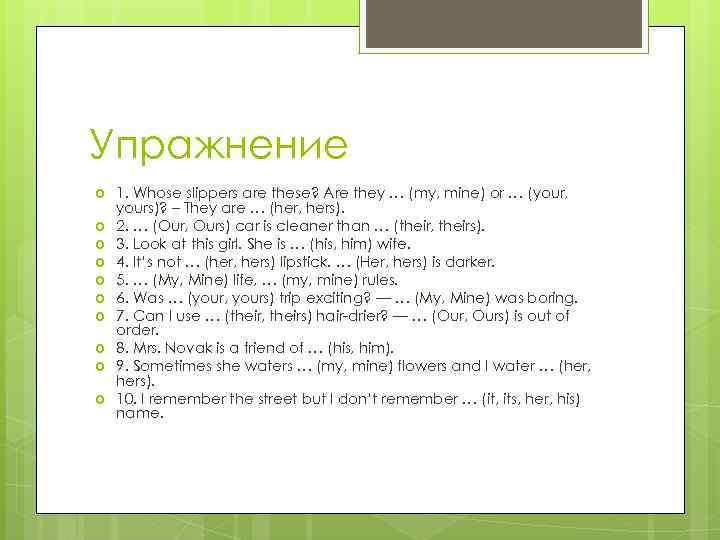 Упражнение 1. Whose slippers are these? Are they … (my, mine) or … (your, yours)? – They are … (her, hers). 2. … (Our, Ours) car is cleaner than … (their, theirs). 3. Look at this girl. She is … (his, him) wife. 4. It’s not … (her, hers) lipstick. … (Her, hers) is darker. 5. … (My, Mine) life, … (my, mine) rules. 6. Was … (your, yours) trip exciting? — … (My, Mine) was boring. 7. Can I use … (their, theirs) hair-drier? — … (Our, Ours) is out of order. 8. Mrs. Novak is a friend of … (his, him). 9. Sometimes she waters … (my, mine) flowers and I water … (her, hers). 10. I remember the street but I don’t remember … (it, its, her, his) name.
Упражнение 1. Whose slippers are these? Are they … (my, mine) or … (your, yours)? – They are … (her, hers). 2. … (Our, Ours) car is cleaner than … (their, theirs). 3. Look at this girl. She is … (his, him) wife. 4. It’s not … (her, hers) lipstick. … (Her, hers) is darker. 5. … (My, Mine) life, … (my, mine) rules. 6. Was … (your, yours) trip exciting? — … (My, Mine) was boring. 7. Can I use … (their, theirs) hair-drier? — … (Our, Ours) is out of order. 8. Mrs. Novak is a friend of … (his, him). 9. Sometimes she waters … (my, mine) flowers and I water … (her, hers). 10. I remember the street but I don’t remember … (it, its, her, his) name.
 Указательные местоимения в английском языке this, that, these, those Указательные местоимения служат для указания на предметы, находящиеся рядом (this, these) или на некотором расстоянии (that, those) от говорящего. Они имеют форму единственного и множественного числа This house is not mine, mine is that green cottage next to it. Этот дом – не мой, мой – вон тот зеленый коттедж рядом с ним.
Указательные местоимения в английском языке this, that, these, those Указательные местоимения служат для указания на предметы, находящиеся рядом (this, these) или на некотором расстоянии (that, those) от говорящего. Они имеют форму единственного и множественного числа This house is not mine, mine is that green cottage next to it. Этот дом – не мой, мой – вон тот зеленый коттедж рядом с ним.
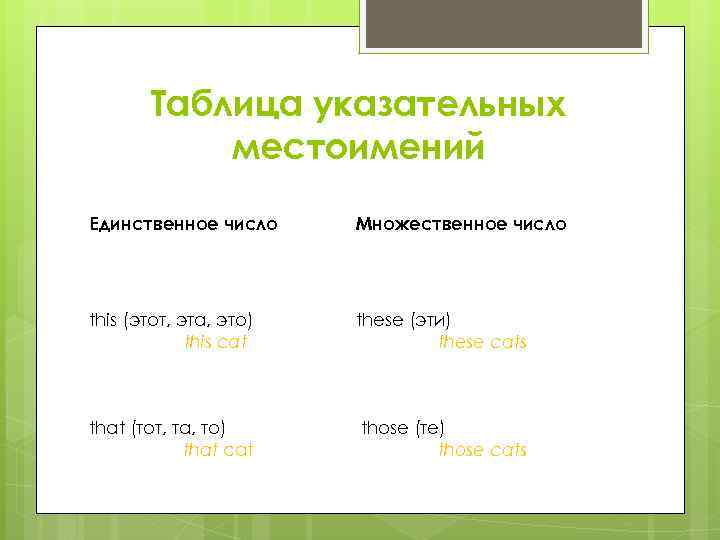 Таблица указательных местоимений Единственное число Множественное число this (этот, эта, это) this cat these (эти) these cats that (тот, та, то) that cat those (те) those cats
Таблица указательных местоимений Единственное число Множественное число this (этот, эта, это) this cat these (эти) these cats that (тот, та, то) that cat those (те) those cats
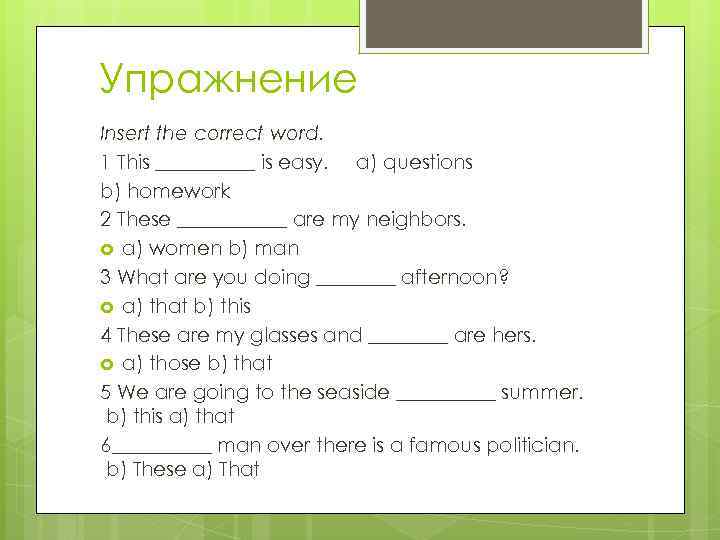 Упражнение Insert the correct word. 1 This _____ is easy. a) questions b) homework 2 These ______ are my neighbors. a) women b) man 3 What are you doing ____ afternoon? a) that b) this 4 These are my glasses and ____ are hers. a) those b) that 5 We are going to the seaside _____ summer. b) this a) that 6_____ man over there is a famous politician. b) These a) That
Упражнение Insert the correct word. 1 This _____ is easy. a) questions b) homework 2 These ______ are my neighbors. a) women b) man 3 What are you doing ____ afternoon? a) that b) this 4 These are my glasses and ____ are hers. a) those b) that 5 We are going to the seaside _____ summer. b) this a) that 6_____ man over there is a famous politician. b) These a) That
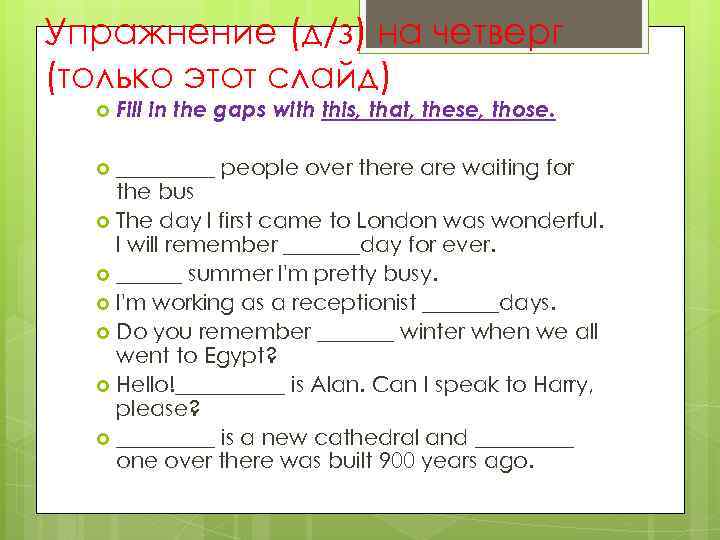 Упражнение (д/з) на четверг (только этот слайд) Fill in the gaps with this, that, these, those. _____ people over there are waiting for the bus The day I first came to London was wonderful. I will remember _______day for ever. ______ summer I'm pretty busy. I'm working as a receptionist _______days. Do you remember _______ winter when we all went to Egypt? Hello!_____ is Alan. Can I speak to Harry, please? _____ is a new cathedral and _____ one over there was built 900 years ago.
Упражнение (д/з) на четверг (только этот слайд) Fill in the gaps with this, that, these, those. _____ people over there are waiting for the bus The day I first came to London was wonderful. I will remember _______day for ever. ______ summer I'm pretty busy. I'm working as a receptionist _______days. Do you remember _______ winter when we all went to Egypt? Hello!_____ is Alan. Can I speak to Harry, please? _____ is a new cathedral and _____ one over there was built 900 years ago.
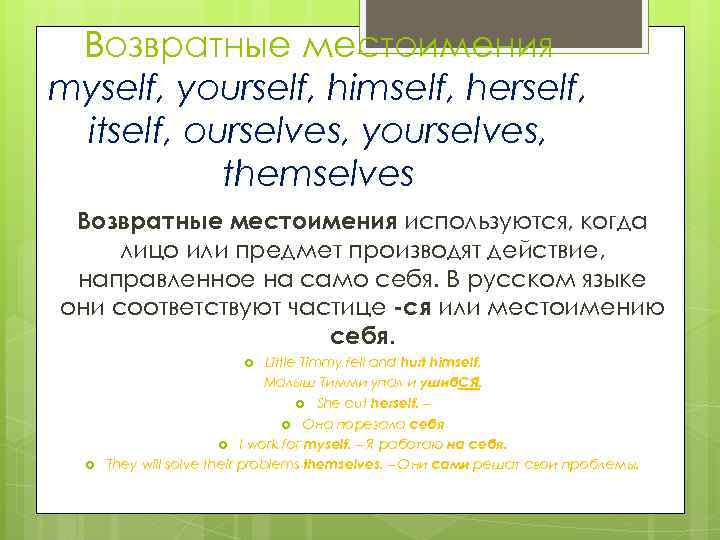 Возвратные местоимения myself, yourself, himself, herself, itself, ourselves, yourselves, themselves Возвратные местоимения используются, когда лицо или предмет производят действие, направленное на само себя. В русском языке они соответствуют частице -ся или местоимению себя. Little Timmy fell and hurt himself. Малыш Тимми упал и ушибся. She cut herself. – Она порезала себя I work for myself. – Я работаю на себя. They will solve their problems themselves. – Они сами решат свои проблемы.
Возвратные местоимения myself, yourself, himself, herself, itself, ourselves, yourselves, themselves Возвратные местоимения используются, когда лицо или предмет производят действие, направленное на само себя. В русском языке они соответствуют частице -ся или местоимению себя. Little Timmy fell and hurt himself. Малыш Тимми упал и ушибся. She cut herself. – Она порезала себя I work for myself. – Я работаю на себя. They will solve their problems themselves. – Они сами решат свои проблемы.
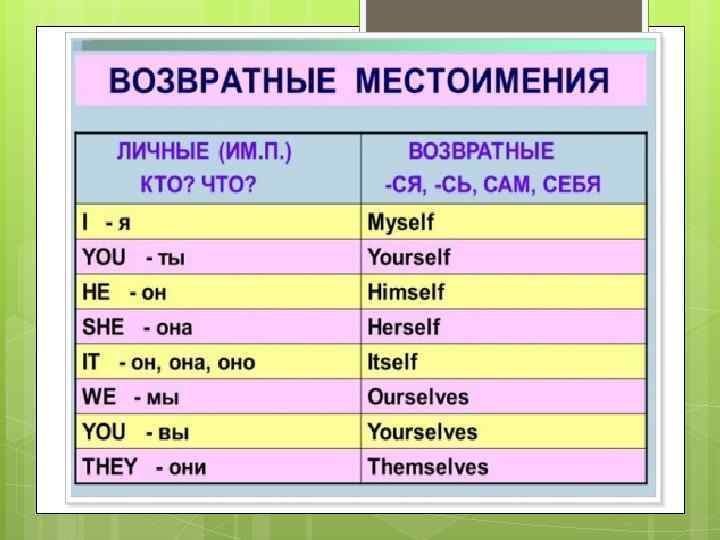
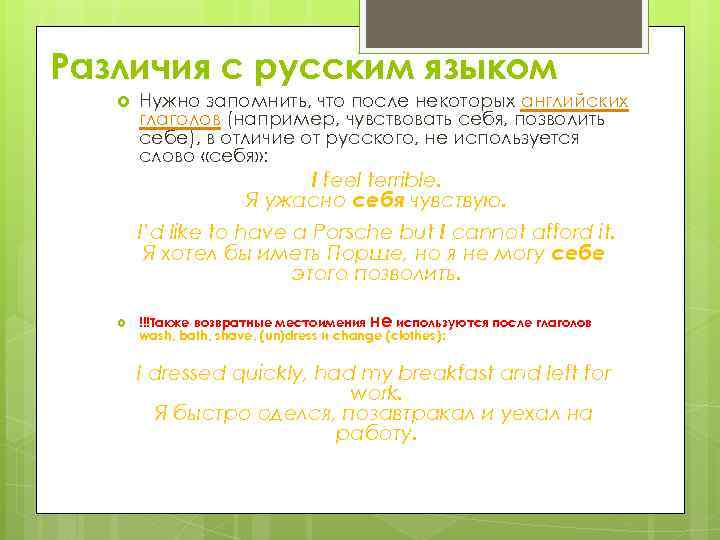 Различия с русским языком Нужно запомнить, что после некоторых английских глаголов (например, чувствовать себя, позволить себе), в отличие от русского, не используется слово «себя» : I feel terrible. Я ужасно себя чувствую. I’d like to have a Porsche but I cannot afford it. Я хотел бы иметь Порше, но я не могу себе этого позволить. !!!Также возвратные местоимения не используются после глаголов wash, bath, shave, (un)dress и change (clothes): I dressed quickly, had my breakfast and left for work. Я быстро оделся, позавтракал и уехал на работу.
Различия с русским языком Нужно запомнить, что после некоторых английских глаголов (например, чувствовать себя, позволить себе), в отличие от русского, не используется слово «себя» : I feel terrible. Я ужасно себя чувствую. I’d like to have a Porsche but I cannot afford it. Я хотел бы иметь Порше, но я не могу себе этого позволить. !!!Также возвратные местоимения не используются после глаголов wash, bath, shave, (un)dress и change (clothes): I dressed quickly, had my breakfast and left for work. Я быстро оделся, позавтракал и уехал на работу.
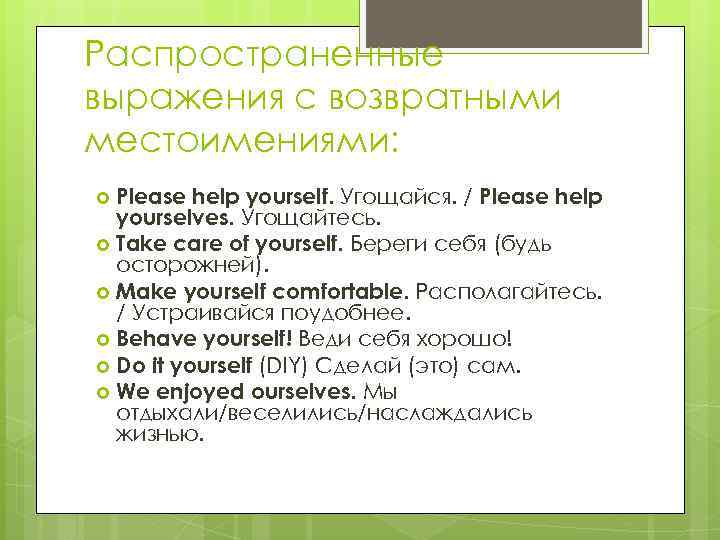 Распространенные выражения с возвратными местоимениями: Please help yourself. Угощайся. / Please help yourselves. Угощайтесь. Take care of yourself. Береги себя (будь осторожней). Make yourself comfortable. Располагайтесь. / Устраивайся поудобнее. Behave yourself! Веди себя хорошо! Do it yourself (DIY) Сделай (это) сам. We enjoyed ourselves. Мы отдыхали/веселились/наслаждались жизнью.
Распространенные выражения с возвратными местоимениями: Please help yourself. Угощайся. / Please help yourselves. Угощайтесь. Take care of yourself. Береги себя (будь осторожней). Make yourself comfortable. Располагайтесь. / Устраивайся поудобнее. Behave yourself! Веди себя хорошо! Do it yourself (DIY) Сделай (это) сам. We enjoyed ourselves. Мы отдыхали/веселились/наслаждались жизнью.
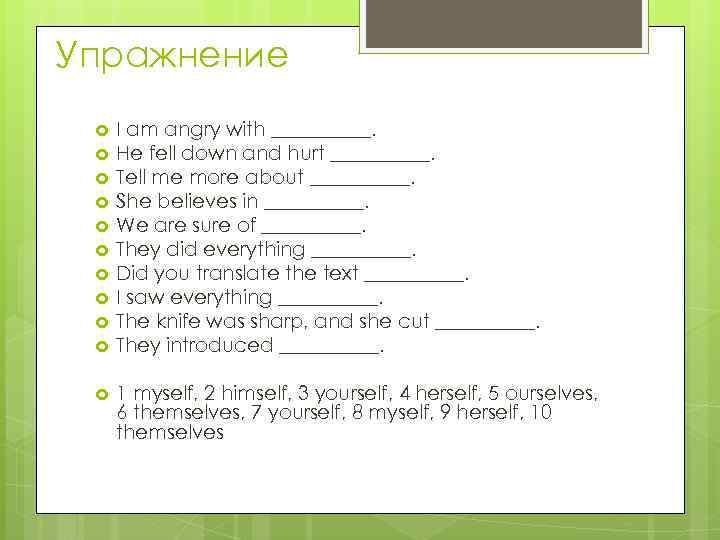 Упражнение I am angry with _____. He fell down and hurt _____. Tell me more about _____. She believes in _____. We are sure of _____. They did everything _____. Did you translate the text _____. I saw everything _____. The knife was sharp, and she cut _____. They introduced _____. 1 myself, 2 himself, 3 yourself, 4 herself, 5 ourselves, 6 themselves, 7 yourself, 8 myself, 9 herself, 10 themselves
Упражнение I am angry with _____. He fell down and hurt _____. Tell me more about _____. She believes in _____. We are sure of _____. They did everything _____. Did you translate the text _____. I saw everything _____. The knife was sharp, and she cut _____. They introduced _____. 1 myself, 2 himself, 3 yourself, 4 herself, 5 ourselves, 6 themselves, 7 yourself, 8 myself, 9 herself, 10 themselves
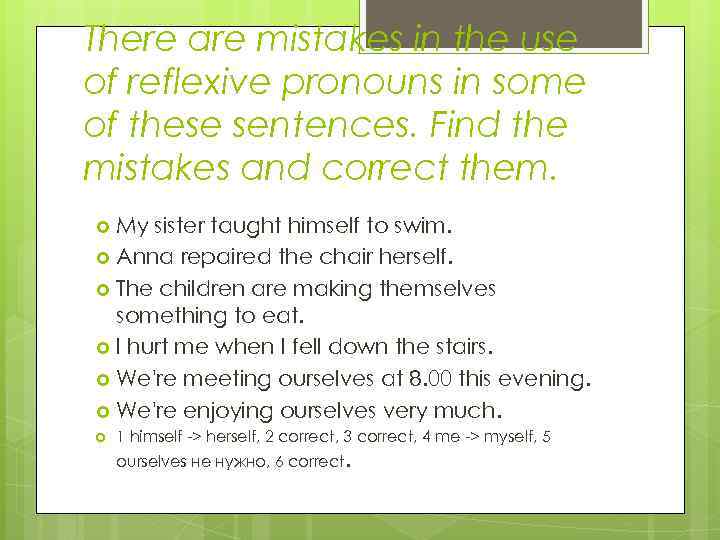 There are mistakes in the use of reflexive pronouns in some of these sentences. Find the mistakes and correct them. My sister taught himself to swim. Anna repaired the chair herself. The children are making themselves something to eat. I hurt me when I fell down the stairs. We're meeting ourselves at 8. 00 this evening. We're enjoying ourselves very much. 1 himself -> herself, 2 correct, 3 correct, 4 me -> myself, 5 ourselves не нужно, 6 correct.
There are mistakes in the use of reflexive pronouns in some of these sentences. Find the mistakes and correct them. My sister taught himself to swim. Anna repaired the chair herself. The children are making themselves something to eat. I hurt me when I fell down the stairs. We're meeting ourselves at 8. 00 this evening. We're enjoying ourselves very much. 1 himself -> herself, 2 correct, 3 correct, 4 me -> myself, 5 ourselves не нужно, 6 correct.
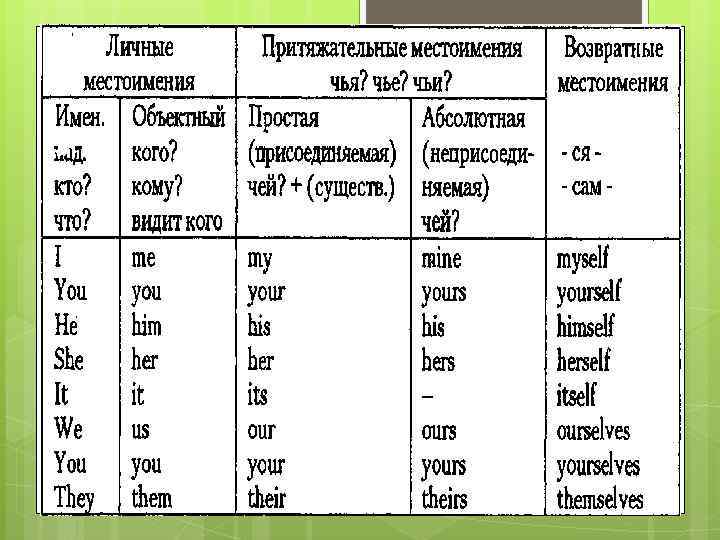
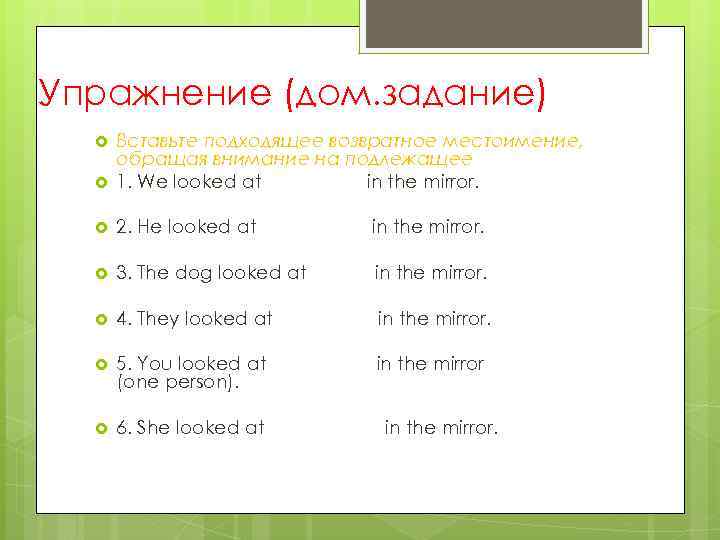 Упражнение (дом. задание) Вставьте подходящее возвратное местоимение, обращая внимание на подлежащее 1. We looked at in the mirror. 2. He looked at in the mirror. 3. The dog looked at in the mirror. 4. They looked at in the mirror. 5. You looked at (one person). in the mirror 6. She looked at in the mirror.
Упражнение (дом. задание) Вставьте подходящее возвратное местоимение, обращая внимание на подлежащее 1. We looked at in the mirror. 2. He looked at in the mirror. 3. The dog looked at in the mirror. 4. They looked at in the mirror. 5. You looked at (one person). in the mirror 6. She looked at in the mirror.
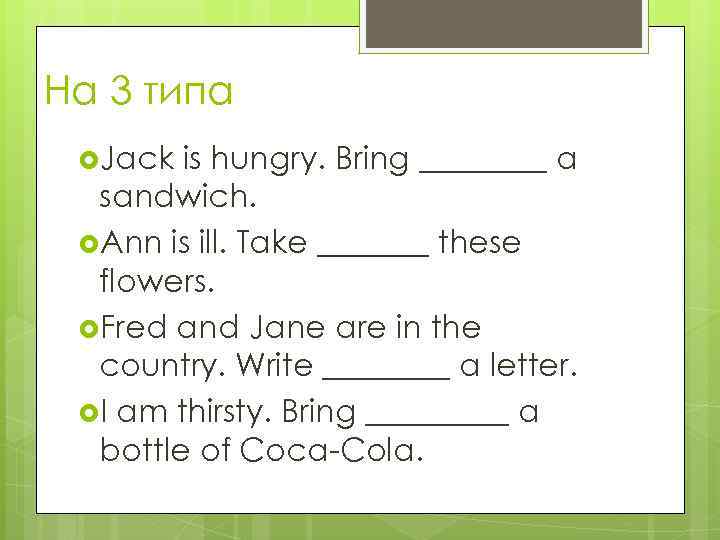 На 3 типа Jack is hungry. Bring ____ a sandwich. Ann is ill. Take _______ these flowers. Fred and Jane are in the country. Write ____ a letter. I am thirsty. Bring _____ a bottle of Coca-Cola.
На 3 типа Jack is hungry. Bring ____ a sandwich. Ann is ill. Take _______ these flowers. Fred and Jane are in the country. Write ____ a letter. I am thirsty. Bring _____ a bottle of Coca-Cola.
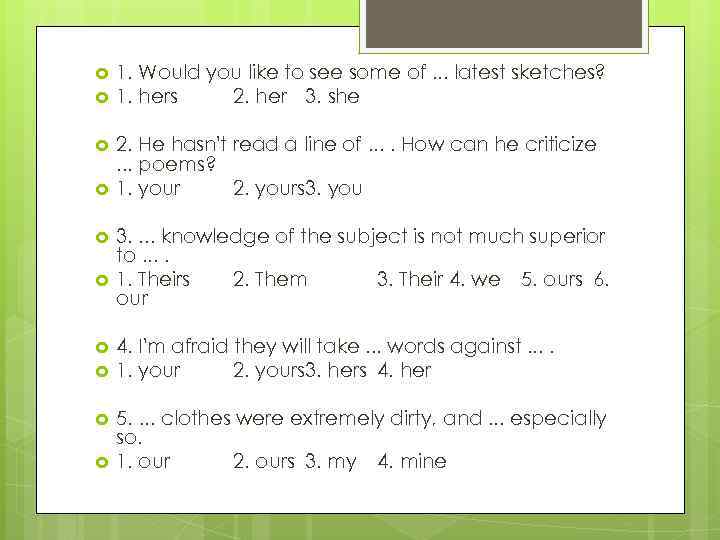 1. Would you like to see some of. . . latest sketches? 1. hers 2. her 3. she 2. He hasn't read a line of. . How can he criticize. . . poems? 1. your 2. yours 3. you 3. . knowledge of the subject is not much superior to. . 1. Theirs 2. Them 3. Their 4. we 5. ours 6. our 4. I'm afraid they will take. . . words against. . 1. your 2. yours 3. hers 4. her 5. . clothes were extremely dirty, and. . . especially so. 1. our 2. ours 3. my 4. mine
1. Would you like to see some of. . . latest sketches? 1. hers 2. her 3. she 2. He hasn't read a line of. . How can he criticize. . . poems? 1. your 2. yours 3. you 3. . knowledge of the subject is not much superior to. . 1. Theirs 2. Them 3. Their 4. we 5. ours 6. our 4. I'm afraid they will take. . . words against. . 1. your 2. yours 3. hers 4. her 5. . clothes were extremely dirty, and. . . especially so. 1. our 2. ours 3. my 4. mine


